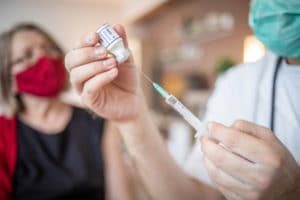Booster shots or booster vaccines have been around for years. You may have received them as a child for things like Hepatitis, Chickenpox, MMR (Measles/Mumps/Rubella), DPT (Diphtheria/pertussis/tetanus). Or as a teenager or adult for Shingles, Pneumonia, MMR, or DPT. Now that the COVID-19 vaccine has been developed and administered, are booster shots in our near future? There are mixed opinions and some amount of debate on this topic. So we wanted to offer a little more information on the science behind these boosters.
Understanding Vaccine Booster Shots
Simply put, booster shots are just another dose of a vaccine that you have previously received. They contain weakened forms of the virus or bacteria that triggers your immune system to attack the organism. In the same way that you would fight off the actual disease. Booster shots train the body to defend itself and kill off the virus before it becomes harmful. Dr. Matthew Sims explains more about how boosters work and the science behind them, in this video.
Boosters prolong the protective immunity that you received from the original vaccination. This is done once the protection starts to wane over a period of time. This time frame, of course, can differ between vaccines. It can range from weeks, months or even years after you received your last shot. Not all vaccines require boosters. Since there is not a noticeable decrease in the antibody protection provided by the initial shot.
Boosters and COVID-19
The Biden Administration continues to be a proponent of COVID-19 boosters. However, there is some concern among scientists from both the World Health Organization (WHO) and the Food and Drug Administration (FDA). The government plans to begin the rollout of the boosters the week of September 20, if it meets the approval of the FDA and CDC. The urgency of booster approval has been sparked largely by the onslaught of the Delta variant among the unvaccinated. This comes with a small number of breakthrough cases within groups of vaccinated individuals.
[UPDATE 9/23/21: The US medicines regulator has authorized coronavirus booster vaccines for people aged 65 and over, people at high risk of severe disease, and those who are regularly exposed to the virus, such as healthcare workers. The decision means that these groups can start to receive a third dose of Pfizer/BioNTech vaccine 6 months after their second dose. Those who have had other vaccines will have to wait for further approvals.]
But the question is: How effective would the booster be? Does the waning protection warrant a booster for all vaccinated persons?
Understanding the Science Behind Booster Shots
In a recent interview, Dr. Katherine O’Brien, Director of the Department of Immunization, Vaccines and Biologicals, states that there are only three reasons to give a booster vaccination:
- If you did not respond adequately to the first one or two prescribed dosages.
- If your immunity starts to diminish.
- The performance of the vaccine does not perform adequately to protect from variants.
She also states that with the COVID-19 vaccines, this does not seem to be the case. They seem to continue to hold up well to the variants. With only slight evidence of weakening after the initial one or two shots.
Eventually, COVID-19 vaccines against mild disease may weaken over time. But it is the belief of most scientists studying the virus and its effect on the body, that the current vaccines will continue to protect the general public against severe disease. Most scientists and health officials agree that a booster vaccine is beneficial to those people with compromised immune systems. Particularly those suffering from diseases such as cancer, HIV, and organ transplant recipients.
Scientists point to potential risks if the boosters are administered too soon, such as a rare heart inflammation known as myocarditis. In addition, unnecessarily boosting vaccines may have implications for vaccine acceptance that can go beyond those administered for COVID-19. However, manufacturers of the vaccine cite side effects similar to the second dose, such as flu-like symptoms such as fatigue, headache, and muscle pain.
But not all scientists agree. Dr. Sanjay Gupta, CNN Chief Medical Correspondent, breaks down recent vaccine data from Israel that supports the argument for COVID-19 boosters. This data speaks to the need for booster shots. However, the information still requires more research to determine the specific need and frequency of the doses.
Key Takeaways
According to CNBC, an expert review of scientific evidence has concluded that COVID-19 vaccine booster shots are not needed at this time for the general public. However, research will continue, evaluating the need to offer vaccine boosters if the protection offered by the original vaccinations begins to weaken.
Currently, most scientists feel that a booster intended for low-risk, vaccinated people is considered inappropriate at this time, citing its efficacy in treating severe infections. But one thing that everyone seems to agree on is the need for a minimum of the two initial vaccinations. Vaccination WILL reduce a person’s likelihood of severe illness, hospitalization, and death. This pandemic is a current, ongoing study. The effectiveness of vaccines and boosters will continue to update as information becomes available.



